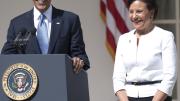President Barack Obama’s reported decision to nominate Penny S. Pritzker ’81 as U.S. Secretary of Commerce—long rumored, as The New York Times reported last winter—may have the local effect of depriving Harvard of one of its leading supporters—and potential fundraisers. President Obama called her “one of our country’s most distinguished business leaders,” the Times reported today, and cited her experience in building companies and her focus on giving American businesses and workers “the best possible chance to succeed by making America a magnet for good jobs.”
According to her biography, Pritzker, a J.D.-M.B.A. graduate of Stanford, is founder, chair, and CEO of PSP Capital Partners, a private investing firm, and of Pritzker Realty Group, among other business ventures. (The Pritzker family, based in Chicago, had diverse financial and business interests, such as the Hyatt hotel chain, on whose board she continues to serve.) Her other engagements have ranged from an active role in fundraising for President Obama’s 2008 election campaign (and co-chairing his re-election campaign in 2012) to board service at the Council on Foreign Relations, the Kennedy Center for the Performing Arts, and Stanford. She has also been a member of the President’s Council on Jobs and Competitiveness, alongside business leaders from diverse industries across the country—seemingly ideal preparation for the commerce secretary’s responsibilities.
At Harvard, Pritzker has served on the University’s Board of Overseers and been active in a number of advisory capacities. In 2006, she and her husband, Bryan Traubert, gave $5 million to the Harvard School of Public Health to support a program aimed at combating childhood obesity in poor and minority urban communities, and to fund scholarships and a junior professorship.
Most recently, as the Corporation’s ranks were expanded and it formed standing committees, which include non-Corporation members, Pritzker was appointed to the facilities and capital planning committee. That group has no doubt been involved in major issues such as the prospective relocation of the School of Engineering and Applied Sciences to the Allston science site, the ambitious renovation and expansion of Harvard Business School’s campus, undergraduate House renewal, and other emerging priorities that will loom large in the University’s capital campaign (now in its quiet phase).
Pritzker’s involvement in University affairs at the highest level, her engagement in higher education, and her demonstrated prowess in fundraising would likely have put her in a position to play whatever role she chose in the capital campaign, formally or otherwise. Service to country and President Obama would preclude that for now.








